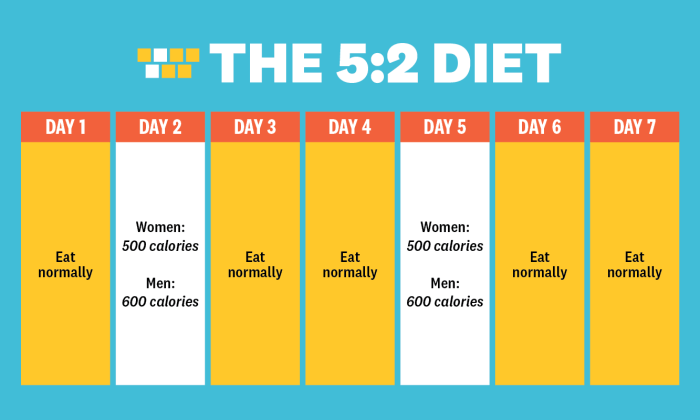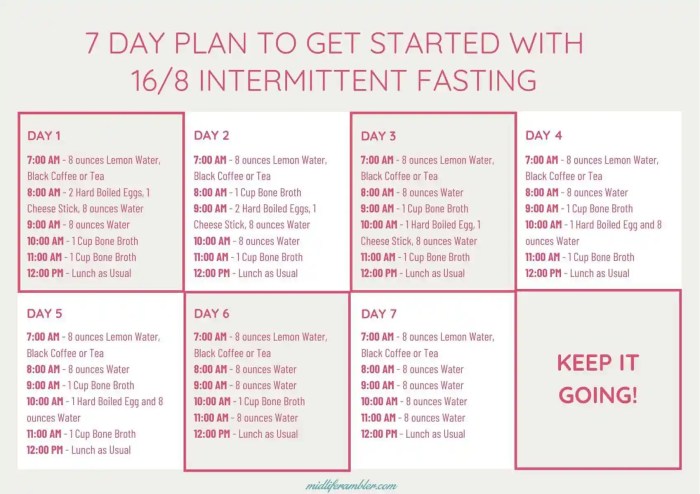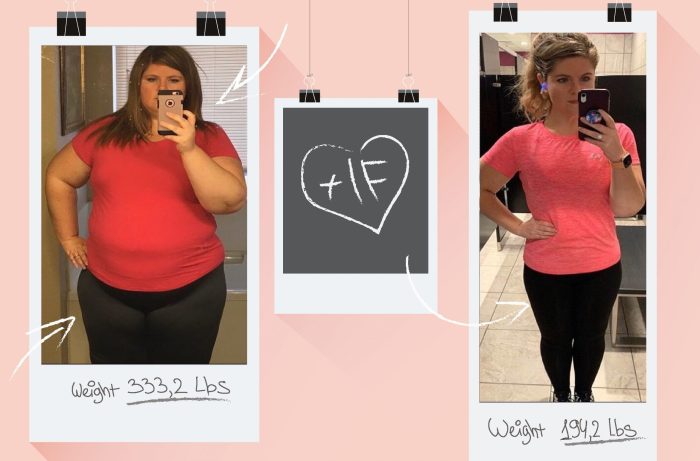Intermittent fasting for women over 40 to lose weight – Intermittent fasting has emerged as a revolutionary approach to weight loss, particularly for women over 40. Embark on this transformative journey as we delve into the intricacies of intermittent fasting, exploring its potential benefits, challenges, and strategies for success. Discover how this innovative lifestyle can empower you to achieve your weight loss goals while promoting overall well-being.
As we navigate the complexities of intermittent fasting, we will unravel its impact on metabolism, insulin sensitivity, and inflammation. We will also explore the relationship between intermittent fasting and exercise, sleep, and hydration, providing practical guidance to optimize your weight loss efforts.
Introduction
Intermittent fasting (IF) is an eating pattern that involves alternating periods of eating and fasting. It has become increasingly popular as a weight loss strategy, especially for women over 40.
As we age, our metabolism slows down and our hormonal balance changes, making it more challenging to lose weight. Intermittent fasting can help to address these challenges by regulating hormones and improving insulin sensitivity, which can lead to increased fat burning and weight loss.
Types of Intermittent Fasting
There are several different types of intermittent fasting, including:
- Time-restricted feeding: This involves restricting eating to a specific time window each day, such as 12 hours of fasting followed by 12 hours of eating.
- Alternate-day fasting: This involves alternating days of eating normally with days of fasting or severely restricting calories.
- 5:2 fasting: This involves eating normally for five days of the week and restricting calories to 500-600 calories on the other two days.
Types of Intermittent Fasting
Intermittent fasting (IF) involves alternating periods of eating and fasting. It’s a flexible approach to weight loss that can be tailored to your lifestyle and preferences.
There are several different IF methods, each with its own pros and cons. Here’s an overview of some popular options:
16/8 Method
The 16/8 method involves fasting for 16 hours each day and eating within an 8-hour window. This could mean skipping breakfast and eating between noon and 8 pm, or having an early dinner and fasting until noon the next day.
Pros:
Intermittent fasting has become a popular way for women over 40 to lose weight. But if you’re looking for a more comprehensive guide on how to lose weight over 40 and keep it off, be sure to check out this article: How to lose weight over 40 and keep it off . It covers everything from diet and exercise to mindset and motivation.
And if you’re specifically interested in intermittent fasting, there’s a whole section dedicated to that as well. So if you’re ready to finally lose the weight and keep it off, this is the article for you!
- Easy to follow and sustainable long-term
- May improve insulin sensitivity and reduce inflammation
- Can help reduce calorie intake without feeling overly restricted
Cons:
- May be challenging for beginners
- Can lead to hunger and cravings during the fasting period
5:2 Fasting
The 5:2 method involves eating normally for 5 days of the week and restricting calories to 500-600 calories on the other 2 days. On fasting days, it’s important to choose nutrient-rich foods to ensure you’re getting essential vitamins and minerals.
Pros:
- More flexible than other IF methods
- May promote weight loss and improve metabolic health
- Can help reduce insulin resistance
Cons:
- Can be difficult to stick to the calorie restriction on fasting days
- May cause hunger and cravings
Alternate-Day Fasting
Alternate-day fasting involves alternating between a day of fasting and a day of eating normally. On fasting days, calorie intake is typically restricted to 25% of normal intake. This method can be challenging but may be effective for weight loss and improving metabolic health.
Pros:
- May promote rapid weight loss
- Can improve insulin sensitivity and reduce inflammation
- May help prevent age-related diseases
Cons:
Intermittent fasting is a great way for women over 40 to lose weight. It’s a flexible and sustainable way to eat that can help you lose weight and improve your overall health. For more tips on losing weight after 40, check out this article on Weight loss tips for women over 40 . If you’re looking for a way to lose weight and improve your health, intermittent fasting is a great option.
- Can be very challenging to follow long-term
- May cause hunger, fatigue, and other side effects
- Not suitable for everyone, especially those with certain health conditions
Meal Planning for Intermittent Fasting
Meal planning is crucial for intermittent fasting, especially for women over 40. During fasting windows, your body relies on stored energy, making it essential to consume nutrient-rich foods during eating windows to support your metabolism and overall health.
Sample Meal Plan
Here’s a sample meal plan tailored to women over 40 on an intermittent fasting regimen:
- Breakfast:Oatmeal with berries and nuts (rich in fiber, antioxidants, and healthy fats)
- Lunch:Grilled salmon with roasted vegetables (provides protein, omega-3 fatty acids, and essential vitamins)
- Dinner:Chicken stir-fry with brown rice (includes lean protein, complex carbohydrates, and fiber)
Nutrient-Rich Foods
When choosing foods during eating windows, focus on nutrient-rich options such as:
- Fruits and vegetables:Provide essential vitamins, minerals, and antioxidants
- Lean protein:Supports muscle mass and satiety
- Whole grains:Offer fiber and complex carbohydrates for sustained energy
- Healthy fats:Essential for hormone production and brain function
Benefits of Intermittent Fasting for Women Over 40
Intermittent fasting (IF) is an eating pattern that involves alternating periods of fasting and eating. It has become increasingly popular as a way to lose weight and improve overall health.
For women over 40, IF may offer several specific benefits, including weight loss, improved insulin sensitivity, and reduced inflammation.
Weight Loss
IF can help women over 40 lose weight by reducing calorie intake and boosting metabolism. In one study, women who followed an IF diet lost an average of 12 pounds more than women who followed a traditional calorie-restricted diet.
Improved Insulin Sensitivity
IF can also improve insulin sensitivity, which is important for regulating blood sugar levels. Insulin resistance is a major risk factor for type 2 diabetes, and IF can help to reduce insulin resistance and improve blood sugar control.
Reduced Inflammation
Inflammation is a major contributor to many chronic diseases, including heart disease, cancer, and Alzheimer’s disease. IF has been shown to reduce inflammation in both animals and humans.
Challenges of Intermittent Fasting for Women Over 40
Intermittent fasting (IF) can be a great way to lose weight and improve your health, but it’s important to be aware of the potential challenges and side effects, especially for women over 40.
One of the biggest challenges of IF for women over 40 is hormonal imbalances. As women age, their hormone levels naturally decline, which can lead to a variety of symptoms, including weight gain, fatigue, and mood swings. IF can further exacerbate these symptoms by causing further hormonal imbalances.
Fatigue
Another challenge of IF for women over 40 is fatigue. When you’re fasting, your body is forced to use stored energy for fuel. This can lead to fatigue, especially in the early stages of IF. If you’re feeling fatigued, it’s important to listen to your body and rest when you need to.
Electrolyte imbalances
Electrolyte imbalances are another potential challenge of IF. Electrolytes are minerals that are essential for a variety of bodily functions, including hydration, muscle function, and nerve function. When you’re fasting, you’re not consuming as many electrolytes, which can lead to imbalances.
Tips for overcoming the challenges of IF for women over 40
There are a few things you can do to overcome the challenges of IF for women over 40:
- Start slowly. If you’re new to IF, start with a shorter fasting period, such as 12 hours, and gradually increase the length of your fasts over time.
- Listen to your body. If you’re feeling fatigued or experiencing other side effects, it’s important to listen to your body and rest when you need to.
- Make sure you’re getting enough electrolytes. You can do this by drinking plenty of water and consuming electrolyte-rich foods, such as fruits, vegetables, and sports drinks.
- Talk to your doctor. If you’re concerned about the challenges of IF for women over 40, talk to your doctor. They can help you determine if IF is right for you and provide you with guidance on how to do it safely.
Intermittent Fasting and Exercise
Intermittent fasting can complement an exercise routine for women over 40 who aim to lose weight. Exercise can enhance the metabolic effects of intermittent fasting, promoting fat oxidation and muscle preservation. It’s crucial to consider your fitness level and gradually incorporate exercise into your fasting regimen.
Guidelines for Incorporating Exercise
- Start gradually:Begin with low-intensity exercises and gradually increase intensity and duration as you adapt.
- Choose enjoyable activities:Find exercises you enjoy to make them sustainable.
- Listen to your body:Rest when needed and don’t push yourself too hard, especially during fasting periods.
- Hydrate well:Drink plenty of water before, during, and after exercise.
- Consider timing:Exercise during your eating window or shortly after breaking your fast to optimize energy levels.
Benefits of Exercise During Intermittent Fasting
- Increased fat oxidation:Exercise during a fasted state promotes the breakdown of stored fat for energy.
- Muscle preservation:Resistance training helps maintain muscle mass, which is essential for metabolism and overall health.
- Improved insulin sensitivity:Exercise can enhance the body’s ability to use insulin, promoting better blood sugar control.
- Reduced inflammation:Exercise has anti-inflammatory properties, which can benefit overall health and weight management.
Intermittent Fasting and Sleep
Intermittent fasting can affect sleep patterns in various ways. While some people report improved sleep quality, others may experience temporary sleep disturbances during the adjustment phase.
During fasting periods, the body produces hormones like cortisol and adrenaline, which can have stimulating effects and interfere with sleep. Additionally, hunger and cravings can also disrupt sleep.
Tips for Improving Sleep While Intermittent Fasting
- Start gradually: Begin with shorter fasting periods and gradually increase the duration as your body adapts.
- Stay hydrated: Drink plenty of water throughout the day, especially before bedtime.
- Eat a balanced meal before the fasting period: Include complex carbohydrates, protein, and healthy fats to promote satiety and reduce hunger pangs.
- Avoid caffeine and alcohol before bed: These substances can interfere with sleep quality.
- Create a relaxing bedtime routine: Establish a consistent sleep-wake cycle, engage in calming activities before bed, and ensure your bedroom is dark, quiet, and cool.
Intermittent Fasting and Hydration: Intermittent Fasting For Women Over 40 To Lose Weight
Staying hydrated is crucial for everyone, but it becomes even more important for women over 40 who are practicing intermittent fasting. As we age, our bodies become less efficient at retaining water, and intermittent fasting can further contribute to dehydration.
Dehydration can lead to a variety of health problems, including fatigue, headaches, constipation, and even kidney stones. It can also make it more difficult to lose weight, as dehydration can slow down metabolism.
Recommended Water Intake
- Women over 40 should aim to drink eight glasses of water per day, even on non-fasting days.
- During fasting periods, it is important to drink even more water, as you will not be getting fluids from food.
- If you are exercising during your fasting window, you will need to drink even more water to stay hydrated.
Electrolyte Replenishment
In addition to water, it is also important to replenish electrolytes during intermittent fasting. Electrolytes are minerals that help to regulate fluid balance in the body. They can be lost through sweat, urine, and feces.
Some good sources of electrolytes include:
- Sports drinks
- Coconut water
- Electrolyte tablets
- Fruits and vegetables
If you are experiencing symptoms of dehydration, such as fatigue, headaches, or constipation, it is important to drink more fluids and replenish your electrolytes.
Hey ladies! Struggling to shed those extra pounds after 40? Intermittent fasting can be a game-changer, but let’s not forget the power of delicious, nutritious meals. Check out these Weight loss recipes for women over 40 that will tantalize your taste buds while supporting your weight loss journey.
Remember, consistency is key in intermittent fasting, so make sure to incorporate these recipes into your eating windows. Let’s get that bikini body back, one healthy bite at a time!
Long-Term Sustainability of Intermittent Fasting
Embracing intermittent fasting as a sustainable lifestyle change is crucial for reaping its long-term benefits. Consistency and gradual implementation are key to success.
To ensure sustainability, consider the following tips:
Set Realistic Goals
- Start with a manageable fasting window, such as 12:12 or 14:10.
- Avoid drastic calorie restriction or skipping meals during the fasting period.
Listen to Your Body
- Pay attention to hunger cues and adjust your fasting schedule accordingly.
- If you experience extreme hunger, fatigue, or headaches, shorten the fasting window or break the fast.
Make Intermittent Fasting a Social Activity
- Fast with friends or family for support and accountability.
- Share recipes and tips to stay motivated.
Meal Planning
- Plan nutritious meals for the non-fasting periods to avoid overeating.
- Focus on whole, unprocessed foods to support satiety.
Hydration
- Drink plenty of water throughout the day, especially during the fasting window.
- Consider electrolyte-rich beverages if fasting for extended periods.
Exercise, Intermittent fasting for women over 40 to lose weight
- Incorporate regular exercise into your routine to boost metabolism and support weight loss.
- Avoid strenuous exercise during the fasting window, as it may lead to fatigue.
Patience and Consistency
- Remember that weight loss takes time and effort.
- Stay consistent with your fasting schedule and make gradual adjustments as needed.
Special Considerations for Women Over 40
Intermittent fasting can be a safe and effective way for women over 40 to lose weight, but it’s important to be aware of the special considerations that come with this age group.
As women age, their bodies undergo a number of changes that can affect their metabolism, hormones, and overall health. These changes can make it more difficult to lose weight, and they can also increase the risk of developing certain health conditions, such as heart disease and osteoporosis.
Hormonal Changes
One of the most significant changes that women over 40 experience is a decline in estrogen levels. Estrogen is a hormone that helps to regulate metabolism, and its decline can lead to weight gain, especially around the abdomen.
In addition, women over 40 may also experience changes in their thyroid hormone levels. Thyroid hormone helps to regulate metabolism, and its decline can also lead to weight gain.
Metabolic Changes
As women age, their metabolism also slows down. This means that they burn fewer calories at rest, and they may need to eat less to maintain a healthy weight.
In addition, women over 40 may also experience changes in their body composition. They may lose muscle mass and gain fat, which can further slow down their metabolism.
Health Considerations
Women over 40 are also more likely to develop certain health conditions, such as heart disease and osteoporosis. These conditions can make it more difficult to lose weight, and they may also require special dietary considerations.
Final Summary
Intermittent fasting offers a promising path to weight loss for women over 40, but it is crucial to approach it with a holistic understanding. By embracing a nutrient-rich diet, incorporating exercise, and prioritizing sleep, you can maximize the benefits of intermittent fasting while minimizing potential challenges.
Remember, the key to success lies in sustainability, making intermittent fasting a way of life rather than a temporary fix. Embrace this empowering approach and witness the transformative power of intermittent fasting on your weight loss journey.
Query Resolution
Is intermittent fasting safe for women over 40?
Yes, intermittent fasting can be safe for women over 40 when approached with caution. It is essential to listen to your body, start gradually, and consult with a healthcare professional if you have any underlying health conditions.
Can intermittent fasting help with hormonal imbalances in women over 40?
Intermittent fasting may have some potential benefits for hormonal balance in women over 40, but more research is needed. It is crucial to consult with a healthcare professional to determine the best approach for your individual needs.
How can I prevent fatigue during intermittent fasting?
To prevent fatigue during intermittent fasting, ensure you are consuming a nutrient-rich diet during your eating window. Stay hydrated by drinking plenty of water and consider electrolyte supplements if needed. Gradually increase the fasting duration to allow your body to adapt.



